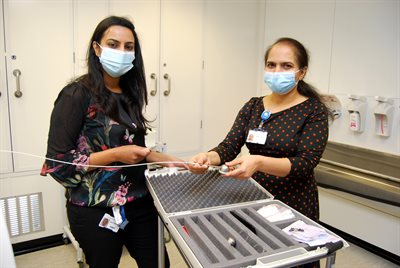NGH launches a new treatment for early skin cancers

Lead Radiotherapist Bansi Mulji-Shah and Clinical Oncologist Dr Deepali Vaidya with the new equipment
Specialists at Northampton General Hospital have launched a new treatment for patients with common skin cancers which can help patients to recover faster and without the need for surgery.
The hospital has introduced Skin Brachytherapy - a highly targeted radiotherapy technique used to treat certain types of basal cell or squamous cell skin cancers. It will be available to suitable patients from across the whole of Northamptonshire.
Treatments are carefully individualised for each patient and – because the treatment spares surrounding healthy tissue from radiation – they can be used instead of surgery and lead to a more rapid and complete recovery with good cosmetic outcomes.
NGH Clinical Oncologist, Dr Deepali Vaidya, and Lead Radiotherapist, Bansi Mulji-Shah, travelled from NGH to Brussels to receive specific training to learn the treatment procedure and techniques and also receive support in the UK from specialists at Leeds Teaching Hospital.
It is the first time the treatment has been delivered in Northamptonshire and NGH will be one of only about 10 hospitals in the UK offering the treatment.
Audrey Barlow, 87, from a village near Northampton, was one of the first patients to have the treatment.
Mrs Barlow, who is married to David, said: “I noticed a scabby little wound on the outside of my left ankle and my GP referred me to hospital.
“They told me I had a basal cell cancer and discussed the new treatment with me.
“I was very happy to have it and do something to help other people to be supported with this new treatment.
“When I came in for my treatments they treated me like royalty. It wasn’t painful. I just felt a little throbbing. They played some music for me, Dean Martin, while it was going on so I just listened to that until it was over.
“At first it scabbed over quite a lot but now it has completely healed and I have hardly even got a scar.”
Mrs Barlow had six sessions of treatments between June 23 to July 9, 2021, and each one took only a few minutes to deliver.
NGH Clinical Oncologist Dr Deepali Vaidya said: “Squamous cell carcinoma and basal cell carcinoma are the most common types of skin cancer and affect about 1,000 people in Northamptonshire each year.
“They are highly curable - and less dangerous than melanoma - but can be disfiguring and costly to treat and using surgery or other forms of more extensive radiation therapy.
"The new treatment can also be a better treatment option for elderly patients, who don't heal as well, or patients with cancers on the nose, ear or eyelid where multiple surgeries whilst achieving comparable treatment outcomes"
NGH’s Physics lead, Stuart Tomlinson, said: "In high-dose-rate brachytherapy, a precise dose of radiation is delivered to the cancerous cells through a custom-fitted applicator which localises the treatment. A course of high-dose-rate brachytherapy routinely includes six approximately 20 minute sessions over two weeks.”
Lead Radiotherapist Bansi Mulji-Shah said: "It can be a better treatment option than other forms of radiotherapy for patients because the treatment is very localised to the cancer thus exposing less healthy tissue around the lesion to radiation.
“This in turn reduces radiation induced skin side effects particularly in the elderly compare to the traditional forms of radiotherapy treatment whilst achieving successful treatment outcomes.
“The simpler practicalities of immobilising patients and delivering treatment whilst maintaining precision has also been positively commented on by many patient experience groups further adding to the advantages of this treatment option"
NGH is now working on expanding the service using 3D printers to create custom fitted applicators for more complex and advanced skin cancers by raising awareness of this treatment option to both local healthcare professionals and patients of its availability.
Posted on Tuesday 7th December 2021